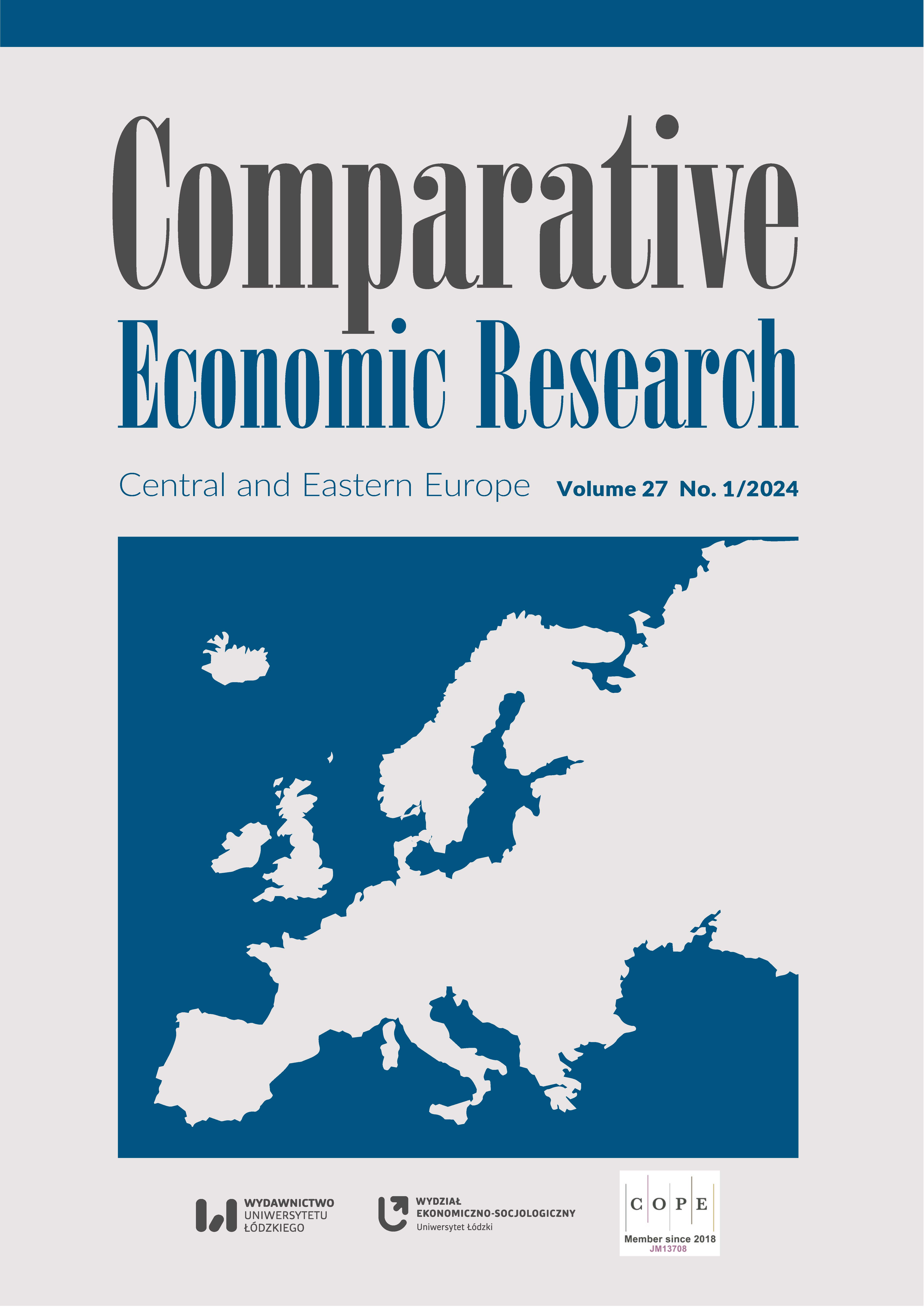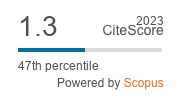The Role of Digital Services Trade Restrictiveness in Exports: Before and During COVID–19
DOI:
https://doi.org/10.18778/1508-2008.27.06Keywords:
digital services trade restrictiveness, exports, Gravity model, trade openness, COVID–19 pandemicAbstract
Digital technology has penetrated various fields, including international trade. This study aims to analyze how barriers/openness to trade in digital services affected exports before the COVID–19 pandemic (2015–2016) and during the pandemic (2019–2020). Based on the Gravity model, exports seem to be influenced by digital services trade restrictiveness, including infrastructure and connectivity restrictions (X1), electronic transaction restrictions (X2), and other restrictions (X3). The panel data regression equation was used to analyze data from various countries (European 17 countries, Asian 8 countries, and Latin American 3 countries) sourced from OECD Statistical Data. The selection of sample countries was based on data availability and homogeneity. The results showed that the effect of digital services trade restrictiveness on exports was low before the pandemic and increased during the pandemic era. Prior to the pandemic, restrictions on electronic transactions had a weak and negative impact on exports; meanwhile, during the pandemic, all restrictions impacted exports, except for other restrictions. In the pandemic era, restrictions on infrastructure & connectivity had a negative impact, but restrictions on electronic transactions had a positive impact on exports due to a decline in global exports and several countries reducing restrictions on electronic transactions.
Downloads
References
Abeliansky, A.L., Hilbert, M. (2017), Digital technology and international trade: Is it the quantity of subscriptions or the quality of data speed that matters?, "Telecommunications Policy", 41 (1), pp. 35–48, https://doi.org/10.1016/j.telpol.2016.11.001
Google Scholar
DOI: https://doi.org/10.1016/j.telpol.2016.11.001
Banalieva, E.R., Dhanaraj, C. (2019), Internalization theory for the digital economy, "Journal of International Business Studies", 50 (8), pp. 1372–1387, https://doi.org/10.1057/s41267-019-00243-7
Google Scholar
DOI: https://doi.org/10.1057/s41267-019-00243-7
Borchert, I., Cory, N., Drake-Brockman, J., Fan, Z., Findlay, C., Kimura, F., Nordås, H.K., Lodefalk, M., Peng, S.Y., Roelfsema, H., Rizal Damuri, Y. (2020), Digital Technologies, Services and the Fourth Industrial Revolution, "Working Paper", 2020–02.
Google Scholar
Brouthers, K.D., Geisser, K.D., Rothlauf, F. (2016), Explaining the internationalization of ibusiness firms, "Journal of International Business Studies", 47 (5), pp. 513–534, https://doi.org/10.1057/jibs.2015.20
Google Scholar
DOI: https://doi.org/10.1057/jibs.2015.20
Budd, J., Miller, B.S., Manning, E.M., Lampos, V., Zhuang, M., Edelstein, M., Rees, G., Emery, V.C., Stevens, M.M., Keegan, N., Short, M.J. (2020), Digital technologies in the public-health response to COVID–19, "Nature Medicine", 26 (8), pp. 1183–1192, https://doi.org/10.1038/s41591-020-1011-4
Google Scholar
DOI: https://doi.org/10.1038/s41591-020-1011-4
Chaney, T. (2008), Distorted Gravity: The Intensive and Extensive Margins of International Trade, "American Economic Review", 98 (4), pp. 1707–1721, https://doi.org/10.1257/aer.98.4.1707
Google Scholar
DOI: https://doi.org/10.1257/aer.98.4.1707
Chaney, T. (2018), The Gravity Equation in International Trade: An Explanation, "Journal of Political Economy", 126 (1), pp. 150–177, https://doi.org/10.1086/694292
Google Scholar
DOI: https://doi.org/10.1086/694292
Drake-Brockman, J., Borchert, I., Cory, N., Fan, Z., Findlay, C., Kimura, F., Yagci, M. (2020), Impact of digital technologies and the fourth industrial revolution on trade in services, "Digital Society, Global Trade and Investment", G20 Insights.
Google Scholar
Ferencz, J., Gonzales, F. (2018), Barriers to trade in digitally enabled services in the G20, "OECD Trade Policy Papers", 232, 17.
Google Scholar
Figueira, C.H.C. (2017), Determinants of the Portuguese GDP stagnation during the 2001–2014 period: an empirical Investigation, Doctoral Dissertation, Nova School of Business and Economics, Portugal.
Google Scholar
Gay, D., (2016), Productive capacity and trade in the Solomon Islands, "United Nations Department of Economic and Social Affairs, Committee for Development Policy Background Paper", 31, New York.
Google Scholar
Gnangnon, S.K. (2018), Impact of multilateral trade liberalization and aid for trade for productive capacity building on export revenue instability, "Economic Analysis and Policy", 58, pp. 141–152, https://doi.org/10.1016/j.eap.2018.02.002
Google Scholar
DOI: https://doi.org/10.1016/j.eap.2018.02.002
López González, J., Ferencz, J. (2018), Digital Trade and Market Openness, "OECD Trade Policy Papers", 217, OECD Publishing, Paris, https://doi.org/10.1787/1bd89c9a-en
Google Scholar
DOI: https://doi.org/10.1787/1bd89c9a-en
Guðjonsson, S., Minelgaite, I., Kristinsdóttir, H., Stankevičienė, J. (2021), Who benefits of trade with China? Examining the effects of free trade agreements on trade flow with China using an adjusted gravity model, "Journal of International Studies", 14 (3), https://doi.org/10.14254/2071-8330.2021/14-3/1
Google Scholar
DOI: https://doi.org/10.14254/2071-8330.2021/14-3/1
Gupta, S., Ghosh, P., Sridhar, V. (2022), Impact of data trade restrictions on IT services export: A cross-country analysis, "Telecommunications Policy", 46 (9), 102403, https://doi.org/10.1016/j.telpol.2022.102403
Google Scholar
DOI: https://doi.org/10.1016/j.telpol.2022.102403
Heuser, C., Mattoo, A. (2017), Services Trade and Global Value Chains, "World Bank Policy Research Working Paper", 8126, https://doi.org/10.1596/1813-9450-8126
Google Scholar
DOI: https://doi.org/10.1596/1813-9450-8126
Mackey, T.K., Nayyar, G. (2017), A review of existing and emerging digital technologies to combat the global trade in fake medicines, "Expert Opinion on Drug Safety", 16 (5), pp. 587–602, https://doi.org/10.1080/14740338.2017.1313227
Google Scholar
DOI: https://doi.org/10.1080/14740338.2017.1313227
Mao, Z., Li, D., Yang, Y., Fu, X., Yang, W. (2020), Chinese DMOs’ engagement on global social media: examining post-related factors, "Asia Pacific Journal of Tourism Research", 25 (3), pp. 274–285, https://doi.org/10.1080/10941665.2019.1708759
Google Scholar
DOI: https://doi.org/10.1080/10941665.2019.1708759
Meltzer, J. (2020), China’s digital services trade and data governance: How should the United States respond, https://www.brookings.edu/articles/chinasdigital-services-trade-and-data-governance-how-should-the-united-states-respond (accessed: 15.06.2020).
Google Scholar
Meltzer, J.P., Lovelock, P. (2018), Regulating for a digital economy: Understanding the importance of cross-border data flows in Asia, "Global Economy and Development Working Paper", 113.
Google Scholar
Nikensari, S.I., Puspitasari, N.F.D., Setyadharma, A., Ratnawati, N. (2021), Determinants of world trade stagnation in three regions, "Journal of International Studies", 14 (2), https://doi.org/10.14254/2071-8330.2021/14-2/10
Google Scholar
DOI: https://doi.org/10.14254/2071-8330.2021/14-2/10
Nordås, H.K., Rouzet, D. (2017), The Impact of Services Trade Restrictiveness on Trade Flows, "The World Economy", 40 (6), pp. 1155–1183, https://doi.org/10.1111/twec.12424
Google Scholar
DOI: https://doi.org/10.1111/twec.12424
OECD (n.d.), https://stats.oecd.org/ (→ Industries and Services → Services Trade Restriction → DSTRI) (accessed: 8.08.2022).
Google Scholar
Ratten, V. (2020), Coronavirus (Covid–19) and the entrepreneurship education community, "Journal of Enterprising Communities: People and Places in the Global Economy", 14 (5), pp. 753–764, https://doi.org/10.1108/JEC-06-2020-0121
Google Scholar
DOI: https://doi.org/10.1108/JEC-06-2020-0121
Roy, M. (2019), Elevating services: Services Trade Policy, WTO Commitments, and Their Role in Economic Development and Trade Integration, "Journal of World Trade", 53 (6), pp. 923–950, https://doi.org/10.54648/TRAD2019037
Google Scholar
DOI: https://doi.org/10.54648/TRAD2019037
Ruzekova, V., Kittova, Z., Steinhauser, D. (2020), Export Performance as a Measurement of Competitiveness, "Journal of Competitiveness", 12 (1), pp. 145–160, https://doi.org/10.7441/joc.2020.01.09
Google Scholar
DOI: https://doi.org/10.7441/joc.2020.01.09
Serrano, R.L., Pinilla, V. (2012), The long-run decline in the share of agricultural and food products in international trade: a gravity equation approach to its causes, "Applied Economics", 44 (32), pp. 4199–4210, https://doi.org/10.1080/00036846.2011.587786
Google Scholar
DOI: https://doi.org/10.1080/00036846.2011.587786
Shiferaw, A. (2017), Productive capacity and economic growth in Ethiopia, "United Nations, Department of Economics and Social Affairs, CDP Background Paper", 34, ST/ESA/2017/CDP/34.
Google Scholar
DOI: https://doi.org/10.18356/225e035f-en
Tayyab, M., Tarar, A., Riaz, M. (2012), Review of gravity model derivations, "Mathematical Theory and Modeling", 2 (9), pp. 82–95.
Google Scholar
Wajda-Lichy, M., Fijorek, K., Denkowska, S., Kawa, P. (2022), The impact of information and communication technology on services exports: Evidence from developed and developing economies, "International Entrepreneurship Review", 8 (3), pp. 69–80, https://doi.org/10.15678/IER.2022.0803.05
Google Scholar
DOI: https://doi.org/10.15678/IER.2022.0803.05
Woetzel, J., Seong, J., Wang, K.W., Manyika, J., Chui, M., Wong, W. (2017), China’s digital economy: A leading global force, McKinsey Global Institute, New York.
Google Scholar
WTO (2019), World Trade Report 2019: The future of services trade, Geneva, https://www.wto.org/english/res_e/booksp_e/00_wtr19_e.pdf (accessed: 20.06.2022).
Google Scholar
Yang, F., Wang, Y., Whang, U. (2023), Trade restrictions on digital services and the impact on manufacturing exports, "The Journal of International Trade & Economic Development", pp. 1–28, https://doi.org/10.1080/09638199.2023.2195958
Google Scholar
DOI: https://doi.org/10.1080/09638199.2023.2195958
Downloads
Published
How to Cite
Issue
Section
License

This work is licensed under a Creative Commons Attribution-NonCommercial-NoDerivatives 4.0 International License.











